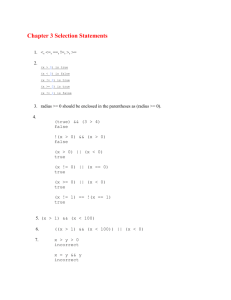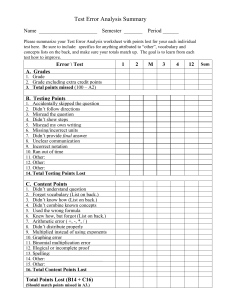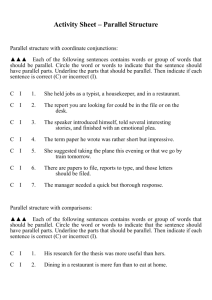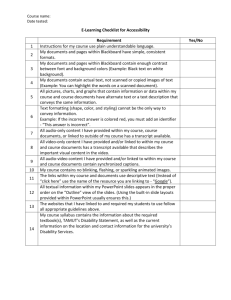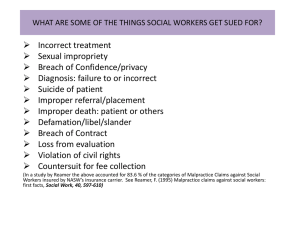Multiple-Choice Quiz Problemset Title Multiple
advertisement
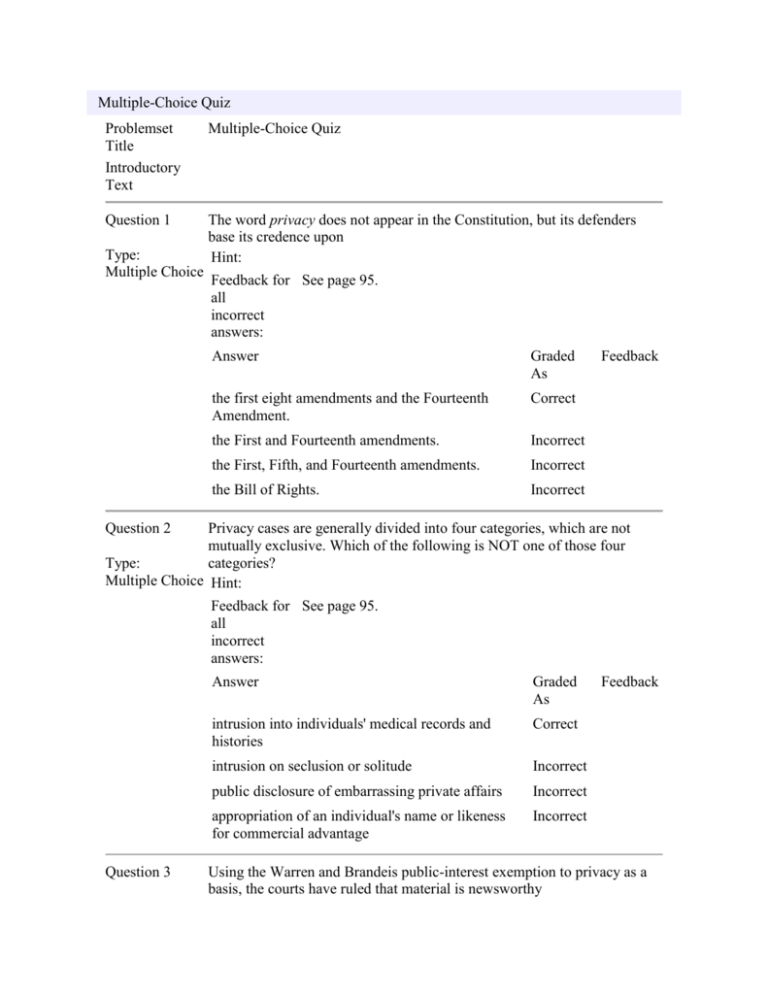
Multiple-Choice Quiz Problemset Title Introductory Text Multiple-Choice Quiz Question 1 The word privacy does not appear in the Constitution, but its defenders base its credence upon Hint: Type: Multiple Choice Feedback for See page 95. all incorrect answers: Answer Graded As the first eight amendments and the Fourteenth Amendment. Correct the First and Fourteenth amendments. Incorrect the First, Fifth, and Fourteenth amendments. Incorrect the Bill of Rights. Incorrect Feedback Question 2 Privacy cases are generally divided into four categories, which are not mutually exclusive. Which of the following is NOT one of those four categories? Type: Multiple Choice Hint: Feedback for See page 95. all incorrect answers: Question 3 Answer Graded As intrusion into individuals' medical records and histories Correct intrusion on seclusion or solitude Incorrect public disclosure of embarrassing private affairs Incorrect appropriation of an individual's name or likeness for commercial advantage Incorrect Feedback Using the Warren and Brandeis public-interest exemption to privacy as a basis, the courts have ruled that material is newsworthy Hint: Type: Feedback for See page 96. Multiple Choice all incorrect answers: Question 4 Type: Multiple Choice Answer Graded As because a newspaper or station carries the story. Correct if the material passes the standard established in New York Times v. Sullivan. Incorrect if it involves a public person who became a public person through his or her own choice. Incorrect All these answers are correct. Incorrect Feedback Professor Thomas Emerson's summary of the issue of a right to privacy can be described as Hint: Feedback for See page 96. all incorrect answers: Answer Graded As attempting to draw a line between the individual and the collective. Correct making a distinction between purposely public individuals and those who are thrust into the public through no conscious action of their own. Incorrect Feedback balancing a libertarian emphasis and a collectivistic Incorrect emphasis. reaching consensus concerning what must be excluded, no matter what, from an individual's collective life. Question 5 Incorrect Journalists who recognize that questions of public-private relationships cannot be answered by merely considering what is technically legal realize that privacy is not only a legal right but a Type: Multiple Choice Hint: Feedback for See page 96. all incorrect answers: Question 6 Type: Multiple Choice Answer Graded As moral good. Correct basic ethical necessity. Incorrect journalistic responsibility. Incorrect requirement for "civilized" society. Incorrect Feedback There are three moral principles that undergird an ethics of privacy for newspeople. Which of the following is NOT one of them? Hint: Feedback for See page 96. all incorrect answers: Answer Graded As There is a clear line delineating persons who have become newsworthy for reasons beyond their control form those who have consciously sought a public life. Correct Decency and fairness are nonnegotiable, even in situations where acting otherwise might be technically legal. Incorrect Feedback "Redeeming social value" is a criterion for selecting Incorrect which private information is worthy of disclosure. The dignity of persons ought not to be maligned in the name of press privilege. Question 7 Incorrect Which of the following correctly describes Facebook? Hint: Type: Feedback for See page 99. Multiple Choice all incorrect answers: Answer Graded As social network Incorrect advertising provider Incorrect Feedback Question 8 Type: Multiple Choice marketing provider Incorrect All these answers are correct. Correct One of the key privacy issues concerning Facebook was the site's baseline stance of "opt-out." What did this mean? Hint: Feedback for See page 100. all incorrect answers: Answer Graded As By default, a Facebook user would share everything. Correct By default, a Facebook user would share nothing. Incorrect Feedback By default, a Facebook user would have to establish Incorrect privacy settings before he or she could "test drive" the site to see if he/she was interested in establishing an account. By default, a Facebook user's decisions about his or Incorrect her account would affect "friends'" accounts as well. Question 9 Will Moffat, one of Openbook's creators, said in an interview that Facebook had "a moral responsibility to respect social norms." Upon what did he base this statement? Type: Multiple Choice Hint: Feedback for See page 100. all incorrect answers: Answer Graded As Facebook's "monopoly on social networking" Correct Facebook's "bloated privacy policy," which just became longer and more complex over time Incorrect Facebook's representative's statement that Facebook's "business is advertising" Incorrect Facebook founder Zuckerberg's reported lack of "belief in privacy" Incorrect Feedback Question 10 What did tech journalist Eliot VanBuskirk mean when he said that "social networking feels free, but we pay for it in ways that may not be readily apparent"? Type: Multiple Choice Hint: Feedback for See page 101. all incorrect answers: Answer Graded As In reality, Facebook users are providing valuable data to marketers, who can then target them quite precisely. Correct Feedback The shift to online interaction, rather than face-to- Incorrect face, will have social costs we cannot yet calculate. In reality, the costs in lost work time and noncomputer-based recreational time are incalculable. Incorrect Young adults, who are less concerned about privacy Incorrect than older Facebook users, will have much of their entire lives in the "public" domain. Question 11 Type: Multiple Choice Question 12 Which of the following BEST describes USA PATRIOT Act supporters' defense of the law? Hint: Feedback for See page 102. all incorrect answers: Answer Graded As It is not new legislation, per se; it only amends existing federal laws. Correct The extraordinary attacks of September 11th required equally extraordinary legislation. Incorrect Such legislation has wartime precedent in the U.S., so when lawmakers created these new laws they had an historical basis. Incorrect None of these answers is correct. Incorrect Feedback Critics of the USA PATRIOT Act cite numerous privacy concerns, even after changes were made in the 2006 House/Senate compromise. One argument is that the act allows the government to secretly obtain a range of personal records, in violation of the Type: Multiple Choice Hint: Feedback for See page 102. all incorrect answers: Question 13 Type: Multiple Choice Answer Graded As First Amendment. Correct Second Amendment. Incorrect Fifth Amendment. Incorrect Fourteenth Amendment. Incorrect Feedback Which of the following best describes the media's role in the coverage of the USA PATRIOT Act, both in its passage and its implementation? Hint: Feedback for See page 103. all incorrect answers: Answer Graded As Overall, the media largely mimicked the Bush administration's communications concerning passage and have not investigated implementation aggressively. Correct Overall, the media were much more diligent and Incorrect thorough in covering the passage of the legislation than they have been in covering its implementation. Overall, the media were much more diligent and thorough in covering the implementation of the legislation than they were in covering its passage. Incorrect It is a mixed record at best and only small, marginal Incorrect media outlets offered any editorial reaction to either the debates over its passage or its implementation. Question 14 Why is privacy a moral good? Hint: Type: Feedback for See page 103. Multiple Choice all Feedback incorrect answers: Answer Graded As because privacy is a precondition for developing a unique sense of self and, politically, a respect for privacy distinguishes between democratic and totalitarian societies Correct Feedback because privacy is inevitably tied to the political and Incorrect societal values found throughout the U.S. Constitution, including its amendments, the document which defines citizens' understandings of morality Question 15 Type: Multiple Choice Question 16 Type: Multiple Choice because privacy is defined as such in the United Nations' 1948 Universal Declaration of Human Rights, and the U.S. Congress has adopted this definition Incorrect because privacy is an absolute and has been considered such since Aristotle's time Incorrect Which of the following are part of Martin Kuhn's "Proposed Code of Blogging Ethics"? Hint: Feedback for See page 104. all incorrect answers: Answer Graded As Attempt to be entertaining, interesting, and/or relevant. Incorrect Reveal your identity as much as possible. Incorrect Promote community by linking to other blogs and keeping a blogroll. Incorrect All these answers are correct. Correct Feedback For Jane Singer and many others who study blogging, ________ is a primary principle in blogging ethics. Hint: Feedback for See page 105. all incorrect answers: Answer Graded As truth Correct respect for privacy Incorrect individuality Incorrect independence Incorrect Feedback Question 17 Ron Deckert, Managing Editor of the Missoulian, faced a very difficult choice about what, if anything, would be printed about the death of Cindy Herbig. What would the morally appropriate decision, from an agapic Type: Multiple Choice perspective, have been in this situation? Hint: Feedback for See pages 107-108. all incorrect answers: Answer Graded As printing a story that focused on the public dimensions of the case, placing Cindy's death in a larger context Correct publishing nothing other than the usual obituary of a local citizen Incorrect Feedback publishing exactly what he did, an edited version of Incorrect The Washington Post's story, at exactly the time he did so publishing The Washington Post's story exactly as it Incorrect appeared in the Post, without Deckert's editing Question 18 What was the Missoulian Managing Editor Ron Deckert's "utilitarian framework" for the decisions he made about publishing the story about Cindy Herbig's death? Type: Multiple Choice Hint: Feedback for See page 108. all incorrect answers: Answer Graded Feedback As the benefit for the many outweighed the cost to the few Correct the public had a right to know Incorrect the story was "newsworthy" because it was going to Incorrect be published in The Washington Post Cindy Herbig's right to privacy died with her Question 19 Type: Multiple Choice Incorrect What is the warning-bell thesis, as described in the discussion of the publication of the photo of the body of a child who drowned? Hint: Feedback for See page 110. all incorrect answers: Answer Graded As a utilitarian appeal (with no factual basis) that publishing such photos can serve as a powerful warning to others and possibly change their actions to prevent such events in the future Correct Feedback a thesis put forth by Charles A. Dana, who summed Incorrect it up by stating, "whatever the Divine Providence permitted to occur I was not too proud to print" a thesis subscribed to by most photojournalists, Incorrect which is best expressed as "a picture is worth a thousand words" but which has more subtle nuances when it comes to photos of minors None of these answers is correct. Incorrect Question 20 Bob Greene of the Chicago Tribune described the photo of the Harte family "at the most terrible moment of their lives" immediately after the drowning death of their son as "________," because it exposed the family Type: Multiple Choice to the entire country. Hint: Feedback for See page 110. all incorrect answers: Answer Graded As Feedback pornography Correct sadism Incorrect peeping Tom behavior Incorrect voyeurism Incorrect
